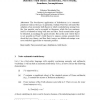Free Online Productivity Tools
i2Speak
i2Symbol
i2OCR
iTex2Img
iWeb2Print
iWeb2Shot
i2Type
iPdf2Split
iPdf2Merge
i2Bopomofo
i2Arabic
i2Style
i2Image
i2PDF
iLatex2Rtf
Sci2ools
LANMR
2007
2007
Dialetheic truth theory: inconsistency, non-triviality, soundness, incompleteness
The best-known application of dialetheism is to semantic paradoxes such as the Liar. In particular, Graham Priest has advocated the adoption of an axiomatic truth theory in which contradictions arising from the Liar paradox can be accepted as theorems, while the Liar sentence itself is evaluated as being both true and false. Such eccentricities might be tolerated, in exchange for great rewards. But in this note I show that it is not possible in Priest’s truth theory to express certain semantic facts about that very theory, and thus that it enjoys no definite advantage over more orthodox approaches to semantic paradox. Key words: Paraconsistent logic, dialetheism, truth theory. 1 Naive axiomatic truth theory Let L be a first-order language with equality containing semantic and arithmetic vocabulary. I will say that an axiomatic truth theory T for L is naive if it has the following characteristics: (i) T is expressed in L (ii) T contains a significant subset of the standard axioms of P...
| Added | 30 Oct 2010 |
| Updated | 30 Oct 2010 |
| Type | Conference |
| Year | 2007 |
| Where | LANMR |
| Authors | Federico Marulanda Rey |
Comments (0)

